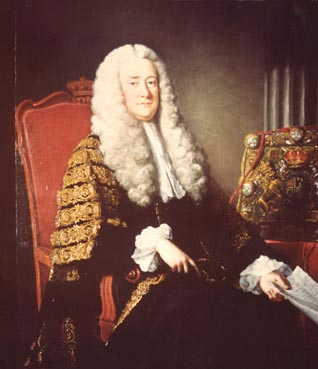In the past week, I’ve been spending my days at the Royal Society. Right off the Mall, it overlooks tourists and fun-employed alike frolicking and picknicking in St. James Park. And considering that it’s London in April, the weather has been unusually cooperative. Indeed, dear readers, life could be worse.
But it is a rare occasion to be in that library with other humans (requisite librarian on duty excluded) much less other humans not falling into geriatric categories. Regardless, I have been trying to learn more about a little known dining club associated with the Society.
Christened “The Thursday's Club Called the Club of the Royal Philosophers” in 1743, I stumbled upon it by accident, but I realized that study of it has been limited to antiquarians (who were almost inevitably former members). The last piece written on it was in 1971. And no one had ever really addressed what it really meant to be a member of this club, and what roles food might have played in this.
Fortunately, the archive contains official minute books as well as attendance records and menus dating back to 1747, so I set off to work on this question. The minute books show that getting in could be a stressful process; membership was limited to 40 and elections were only held once a year. (Sometimes annual elections would be postponed altogether if they didn’t feel like enough members had died or had been kicked out for non-attendance.)
But in an entry from May 3 1750, a loop-hole appeared.
“Resolved nem. con. that any nobleman or gentleman complimenting this company annually with venison not less than a haunch, shall during the continuance of such annuity be deemed an honorary member and admitted as often as he comes, without paying the fine which those members do who are elected by ballot.”
Why did they come up with this rule? I turned to the attendance records, and found that a guy named Philip Yorke, (who upon his elevation into the Peerage became Viscount Royston) began gifting venison to the club. He apparently started in 1748, which is duly recorded by the Society’s treasurer, and continued to do for almost two decades. His last recorded donation is July 14, 1763, and he died the next year.
 |
| Venison donor extraordinaire |
Venison was a very expensive meat, available primarily to the wealthy. But it wasn’t the only item that warranted special status in the club. At another meeting on October 4, 1750, the club minute books amend the rule.
“Resolved nem. con. that any gentleman complimenting this society annually with a turtle should be considered as an honorary member.”
This time, the donor was a guy named Andrew Mitchel. The Treasurer states the following:
“Andrew Mitchel, Esq., proposing to compliment this company with a turtle which he expects very soon from the West Indies. it was resolved nem. con. that any gentleman giving a turtle annually should be considered as an honorary member during the payment of that annuity.”
Unlike York’s gift of venison, it didn’t take almost two years for the members to turn this unexpected food donation into a bona fide ticket to honorary membership. The dates show us that the club resolved to amend the rule right then at the dinner itself, before members had even gotten to taste the goods. In this case, the eager foodies might have spoken too soon, for at the next Thursday’s dinner, the treasurer writes that the turtle happened to die as the ship came up the channel. In lieu of the turtle, the company had to make do with a dinner that included, among other things:
-calves head hashed
-tongue and udder
-leg of pork and pease
-turkey boiled with oysters
And finally, on June 27, 1751, we get one more amendment to the rules.
“Mr. Hanbury having this day entertained the company with the above mentioned chine of beef the length of which was 84 inches and the weight upward of 140 lbs, it was agreed nem. con that two such chines were equal to halfte a buck or a turtle and entitled the donor to be an honorary member of the Society.”
Beef was considered a national food, the bread and butter of Englishness. Here's one of my favorite 18th century homages to it. (Note the idolatrous French, who live on that weak and watery soup being carried in the foreground, salivating over the meat.)
 |
| Hogarth’s ‘The Gates of Calais, or The Roast Beef of Old England,’ 1749. |
But to the doctors, aristocrats and literati that were members of the Thursday's Club, it was no match for these more aristocratic delicacies.
The rules concerning honorary membership and these ‘gifts’ were revoked in the 1770s. Why was it? And what does it all mean?
All in good time, dear readers. Stay tuned.
Fabulous insights by a remarkable and brilliant young commentator. You truly shed interesting light on how the hegemony of class and the oppressive policies of the elite have been so easily subverted by crass bribery and the unsatisfying promise of novelty.
ReplyDeleteKudos to you, my dear Lady of Quality, kudos to you!